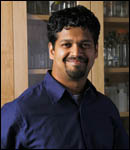Nitin Baliga

1. What is your educational and professional background?
Nitin Baliga did his Bachelors in Microbiology in 1992 and Masters in Marine Biotech in 1994. He finished his PhD program in Microbiology in 2000.
2. How did you come to ISB?
When he came to America, he had three choices. One was to study gene regulation at San Diego or Harvard, both of which were very well established institutions. His third choice was to come to Seattle, “to work on this really big vision of understanding regulatory circuits for entire cells. Something I got really excited about. It was a big risk, so few people would have taken the risk at that time. But I was at a position to do that because I was transitioning from PhD to post-doc and you can take risks at that time.” So, then he decided to become a Post-Doc here at ISB.
3. How did you become a Faculty member?
“So I did a post-doc for two years and took a cell that very few people study, so I essentially carved out a niche for myself. Rather than compete with all the big laboratories, I decided to start from scratch and that gave me an edge. It allowed me to actually control everything about how the project works. So essentially I was at the right place at the right time asking the right type of questions and I hit the jackpot very quickly.” Within a year and a half or two, he became a senior research scientist and he got a faculty position in 2005.
4. How did you get involved with systems biology?
“I did not hear about it until in 2000, the year I got a position. However, I worked becoming more and more aware about the complexity of biological systems and it became very clear that as you try to understand the phenomenon at a few genes that when you look at more genes it doesn’t scale very well. It becomes harder to explain some of the larger phenomena. To me, it became independently obvious that you need to look at many more genes at the same time.”
5. Do you miss doing actual lab work, like spending time in the bench?
“I do miss some of the lab work, but I prefer to do some of the bigger thinking.” When doing lab work one has to focus entirely on the one experiment itself. When you're coordinating an entire project you can see the much larger picture from data gathered by many individual experiments. While doing the lab work is fun, being able to work with the larger scope is more exciting to him.
6. What do you do as a faculty member?
Being a faculty member involves doing independent research, putting a team together, and gathering the resources necessary to run a lab. A faculty member needs to travel a lot and keep in touch with his field and present the findings of his lab in talks. Many faculty members also teach or do educational programs. A faculty member also needs to mentor graduate students, post-docs, etc. and make sure they meet their goals.
7. What is the most challenging part of your job?
“The hardest part of this job is to manage people and make sure that they’re happy.” You have to accommodate peoples’ career goals, personal interests, etc. and keep everyone satisfied while furthering the goals of the lab as well. You also have to serve as a mentor to students and postdocs and have to tailor the mentoring to suit the needs of each individual person.
8. Why did you get more involved in science education programs?
“There are two reasons. I’ve always been excited about teaching. I’m a visual learner…Halobacteria has a lot of cues in terms of visual appearance and properties that would excite any student. So I thought that it would be a very cool medium for education…The second reason is when you’re doing research and trying to raise money, you get money from federal agencies, one of which is NSF, which is taxpayer money so one of their other interests is not only research but, because it is taxpayer money, they also push for education…Plus, I think it’s the right thing to do. ”
9. If you could go back in time, would you have done anything differently?
He would have paid attention to some of the other disciples like math and physics, assuming that this time would not have detracted from the good choices that he did make. He would have also done more internships because he feels that learning is not only taken from books, but also experiences as well.
10. Where do you see yourself in the future?
“What Lee Hood always quotes is you have to be constantly reinventing yourself. When you have done something really well, you need to be very comfortable with what you’ve done and keep working in that area. But your creativity diminishes.” So now that the Baliga Group has created a model for Halobacteria that can explain some of its behavior, they want to continue with the research of Halobacteria but also they want to do what they have done with Halobacteria to other organisms as well and compare their findings.
11. What are the skills necessary to be a good scientist?
“Critical thinking is probably the most important. Taking your observation or someone else’s observations and from that ask questions that require explanations…Once you ask the important question, you need to be able to design an experiment…You don’t limit the questions you answer and the experiments you do, to the expertise you have."
|

